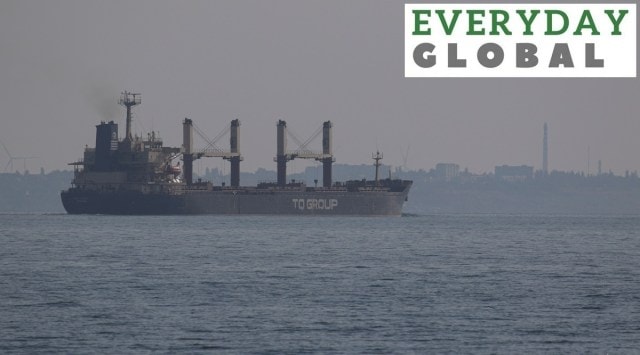What is the Black Sea grain deal, which Russia has pulled out of
What is the Black Sea grain deal, why is it important, and why has Russia withdrawn from it? We explain.
 Turkey-flagged bulk carrier Tq Samsun leaves the sea port of Odesa, amid Russia's attack on Ukraine, in Ukraine July 16. (Photo: Reuters)
Turkey-flagged bulk carrier Tq Samsun leaves the sea port of Odesa, amid Russia's attack on Ukraine, in Ukraine July 16. (Photo: Reuters) Russia has said it is withdrawing from the Black Sea grain deal, which assured safe passage to ships carrying grain from Ukraine.
Brokered by the UN and Turkey, the deal was set to expire Monday, and negotiations had been on to get the Kremlin to extend it. Kremlin spokesperson Dmitry Peskov said the agreements had reached a “de facto” end on Monday, BBC reported.
What is the Black Sea grain deal, why is it important, and why has Russia withdrawn from it? We explain.
What is the Black Sea grain deal?
Ukraine is among the world’s biggest exporter of foodgrains, such as wheat and corn, and a major contributor to the UN’s food aid programmes. When Russia invaded the country and blockaded its ports, it sent food prices soaring and raised fears of food security in the poorer nations of the world. Pakistan, for instance, saw wheat prices skyrocket to crisis levels.
On July 22, 2022, the UN and Turkey got Russia to agree to the Black Sea Grain Initiative, under which cargo ships would be allowed to travel from and to three Ukrainian ports of Odesa, Chornomorsk and Pivdennyi (Yuzhny), after inspection that they weren’t carrying arms. The safe passage in the Black Sea was 310 nautical miles long and three nautical miles wide.
The deal had been extended twice.
According to a Reuters report from June, nearly 32 million tonnes of mostly corn and wheat have been exported by Ukraine under the deal.
Why has Russia not agreed to renew it?
Russia claims that the promises made to it under the deal have not been met, and it is still facing trouble exporting its own agricultural products and fertilisers because of the many sanctions the West has slapped on it.
While there is no direct restriction on Russia’s agricultural products, the country says barriers on payment platforms, insurance, shipping and other logistics are hampering its exports.
“We have repeatedly shown goodwill to extend this deal,” Putin told reporters July 13, as quoted by AP. “Enough is enough.”
Russia has also said that it had agreed to the grain deal in order to help ensure global food security, but Ukraine has since exported mainly to high-and middle-income countries. The UN says while this is true, poorer countries have been helped by food prices cooling down.
According to Reuters, the European Union (EU) is now considering connecting a subsidiary of the Russian Agricultural Bank (Rosselkhozbank) to the Society for Worldwide Interbank Financial Telecommunications (SWIFT), from which it was cut off due to the war, to allow grain and fertiliser transactions.
How are Russia, Ukraine grain exports faring amid the war?
The Indian Express has earlier reported that Russia is consolidating its position as the world’s top wheat exporter, even as Ukraine’s shipments are projected to more than halve from their peak and production plunge to a 11-year-low.
The primary destinations for Russian wheat are the Middle East, North Africa and Central Asia, led by Egypt, Iran and Algeria. While the Black Sea Grain Initiative helped Ukraine export 16.8 million tonnes in 2022-23, about 39% of its wheat actually moved via the land route to Eastern Europe. Ukraine’s markets have shifted dramatically from Asia and North Africa before the war to mainly Europe, mostly due to ease of shipment. In fact, glut of Ukrainian grain has led to protests from farmers in some Eastern European countries, who said the price of their produce had crashed.
- 01
- 02
- 03
- 04
- 05






































